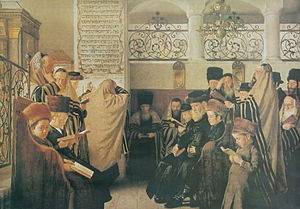At first sight the laws of Nazir, detailed in Parashat Nasso, seem to suggest that the Torah encourages people to take upon themselves vows of abstinence. A closer, contextual reading, makes it clear that the life of a hermit, away from society and from the world’s bounty, is not the Torah’s idea of a perfect life. It makes perfect sense to anyone who knows his Tanakh. The Torah indulges us with the description of the Garden of Eden and the marvels of creation; it praises the beauty of our mothers and meticulously describes the architectural wonder of the Tabernacle. It never tires of mentioning the bounty of the land of Canaan and the riches awaiting those who will inherit it. The book of Psalms and the Song of Songs paint breathtaking canvases of the natural world and the human condition, even if only as allegories. There is no doubt that the Torah wants us to enjoy the opulent smorgasbord God has placed in front of us.
The goal is to elevate the mundane actions and the quotidian life by infusing them with faith, loving kindness, justice and honesty. It is very easy to turn your back to the world and walk away. Settle down in the desert and see no one. Be alone with God, hone your spirituality and find your true identity as the poet said (America) – “in the desert you can remember your name for there ain’t no one for to give you no pain”. This is indeed what Jeremiah wished for (Jer. 9:1), but knew he could not have as a prophet whose role is to be with the people. It is much more difficult, but nonetheless enriching and fulfilling to integrate normal life and Torah values.
Unfortunately, though, it seems that we are gradually adapting the Nazirite view of the world rather than the one celebrating life. Rather than adhering to the Rabbinical adage (Yer. Kiddushin, 4:12): “HaShem will punish those who refused to enjoy that which He has given them”, they herald the concept that the stricter the better.
Now, if certain individuals want to be strict and afflict their souls and bodies, no problem, the Torah gave them a reluctant permission to do so, but why would they do it to others? At least let them admit that for almost any opinion in Halakha that says that something is forbidden, there is another that says it is allowed. So let us not look down on those who are “lenient” because they are very strict in keeping the concept of enjoying God’s blessings.
Here are some examples that might be of use in the summer which are, for some, precariously near:
1. Relying on the Eruv: it has been the Minhag of all communities, Ashkenazim and Sephardim alike, to rely on an eruv in ANY city in the world. Those who choose not to rely on it and go against the widespread Minhag must understand that they are the exception that goes against the norm. They are welcome to walk in the summer heat with no water and full regalia, but they should not teach their children, as I have personally witnessed, to close their eyes when they see someone “carrying” on Shabbat. Or consider this case which I have also witnessed: during the recent heat wave a “strict” husband was pleasantly marching empty handed while his “lenient” wife had no choice but lag behind with a toddler on one hand and his tricycle on the other. Is this the way of Torah? I really wanted to remind this guy that the rabbis say that a husband and wife are one body and he is therefore “carrying” now, so they should either both stay at home or both rely on the Eruv, because it is OK to be a Nazir, a strict hermit for yourself but it is not OK to impose it on others and make them suffer.
2. Exercising on Shabbat. It is clearly stated in the Shulhan Arukh that jogging and exercising is allowed for recreational purposes but not for pure medical ones (Orah Hayyim 301:2 and 328:42). This includes using weights and non-electric machinery such as stationery bikes. There are those who say it is not in the Spirit of Shabbat because they simply do not connect to the practice, but this is exactly what the Shulhan Arukh says: those people who enjoy this activity are allowed to do so. Period.
3. Swimming: Hakham Ovadia Yossef rules, in Yalkut Yossef on Shabbat, vol. 2, based on the Talmud and the Shulhan Arukh that swimming in a pool on Shabbat is allowed, but by the time the fifth volume was published the same ruling was restated with many restrictions because of “what will people say” and the “spirit of Shabbat”. Here again we must say that if one does not enjoy the pool, no one will push him there, but if the Halakha clearly says that it is allowed, he should not mistake swimmers for sinners.









Parashat Behar – Weekday Torah Reading (Moroccan TeAmim)